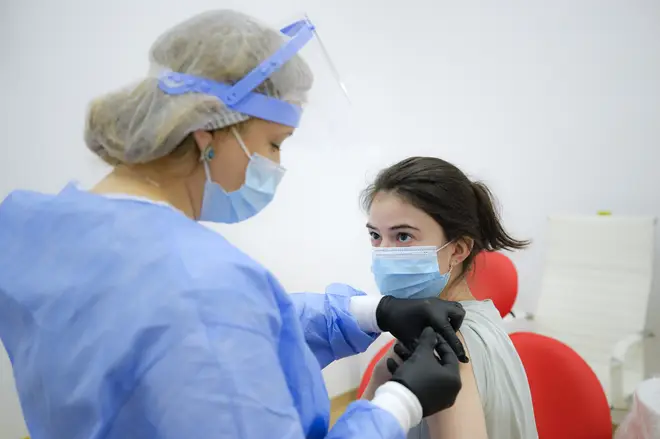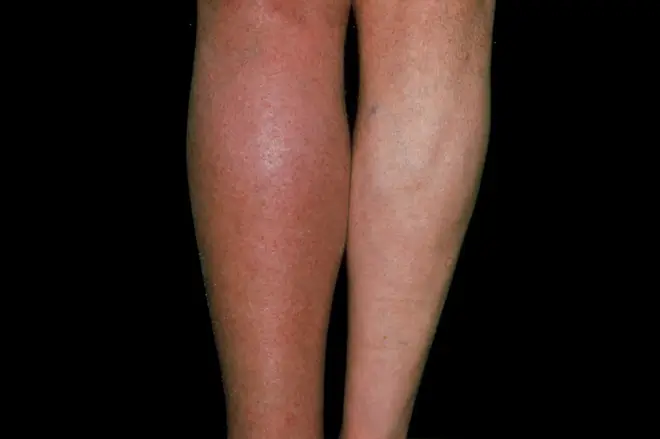
Clare Foges 6pm - 9pm
7 April 2021, 19:31 | Updated: 7 April 2021, 19:42

The UK's medicines regulator has found a possible link between the AstraZeneca vaccine and a rare blood clot condition. So what are blood clots? And how do you know if you have a blood clot?
Britain's Medicines and Healthcare products Regulatory Agency (MHRA) said on Wednesday that the benefits of the Oxford-AstraZeneca jab continue to outweigh any risks.
However, after finding that the risk-benefit for the under-30s is lower - as they are at a lesser risk of becoming seriously ill with Covid-19 - the MHRA added that this age group will be offered an alternative jab.
People who are over the age of 29, or have had a dose already, should still receive their first and second AstraZeneca jabs when offered.
The European Medicines Agency (EMA) also said that unusual blood clots should be listed as a "very rare" side effect of the AstraZeneca Covid vaccine.
Recommendations to suggest other vaccines for the under-30s were made "out of the utmost caution" rather than because of "any serious safety concerns", chairman of the Joint Committee on Vaccination and Immunisation (JCVI) Professor Wei Shen said.
So what is a blood clot? How do you know if you have a blood clot? And what are the symptoms of a blood clot?

A blood clot, also known as a thrombus, is the final product created when blood coagulates from a liquid to a gel-like substance.
But the rare blood clot condition that is causing concern is called cerebral venous sinus thrombosis (CVST).
It is a specific type of clot that prevents blood from draining from the brain, as well as low platelet counts - cells that help blood clot.
The NHS website says they "can be very serious and need to be treated quickly" and can be best prevented by "staying healthy and active".
However, AstraZeneca vaccine-related blood clots are "very rare" and the risk of dying from coronavirus remains much greater than the risk of death from this side effect, executive director of the EMA Emer Cooke said.
Read more: AstraZeneca vaccine trial on children paused amid blood clot fears
Watch: Former head of UK vaccines regulator: 'No reservations' about AZ jab

The benefits of the AstraZeneca vaccine outweigh the risks
During a press conference on Wednesday, MHRA chief executive Dr June Raine listed the blood clot symptoms to look out for before seeking swift medical advice.
She told the briefing: "Anyone who has symptoms four days after vaccination or more should seek prompt medical advice. A new onset of a severe or persistent headache or blurred vision, shortness of breath, chest pain, leg swelling, persistent abdominal pain or indeed unusual skin bruising or pin-point spots beyond the injection site."
The NHS website lists the following general symptoms for blood clots:

Under-30s to be offered alternative to Oxford/AstraZeneca jab
The EMA said data showed the Oxford vaccine-related blood clots reported had been found in veins in the brain, the abdomen and arteries, combined with low levels of blood platelets and sometimes bleeding.
People may become short of breath if they have developed a blood clot and they may develop persistent abdominal or chest pains.
Blood clots can also appear as a swelling in the leg or as tiny blood spots under the skin beyond the area where the jab was administered.
Individuals may also experience severe headaches or blurred vision.
Read more: Seven die of blood clots in UK after AZ jab but no evidence of link
Explained: What are the different vaccines for Covid-19?

'Unusual blood clotting should be listed as a possible side effect of AstraZeneca vaccine'
Up to 31 March, the MHRA has received 79 reports of blood clots accompanied by low blood platelet count, all in people who had their first dose of the vaccine.
Of these, a total of 19 people have died, although it has not been established what the cause was in every case.
The 79 cases occurred in 51 women and 28 men, aged between 18 and 79.
Of the 19 who died, three were under the age of 30, the MHRA said. Some 14 of those cases were CVST while the other five were thrombosis.
There have also been reports of CVST cases in Germany and cases of blood clot clusters in Norway, the Netherlands and Denmark but experts say these incidents are rare.